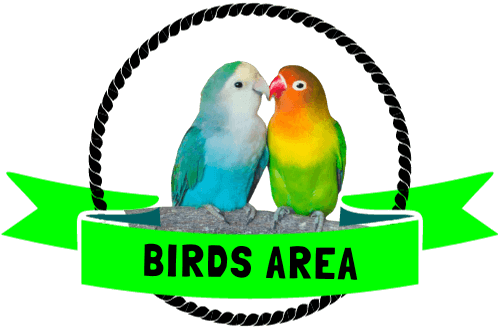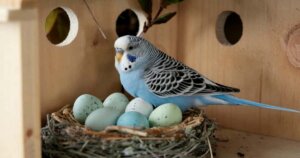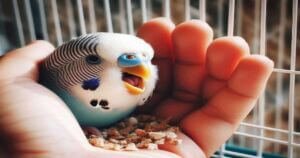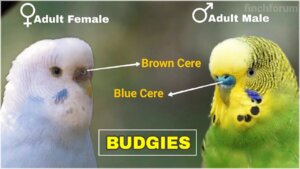What’s Abnormal in Budgies? Discover Warning Signs
Abnormal behavior in budgies is any behavior that deviates from their usual patterns. Budgies are social creatures, so becoming withdrawn, aggressive, or displaying strange behavior may signal a problem.
Now, budgie owners must monitor their pet’s behavior closely and seek veterinary care if anything seems unusual. Additionally, changes in diet, a new bird in the cage, or being in a new environment can all affect a budgie’s behavior and potentially lead to abnormal behavior.
We’ll look at the common signs of abnormal behavior in budgies and what they may signify.
What Is An Abnormal Behavior in Budgies?
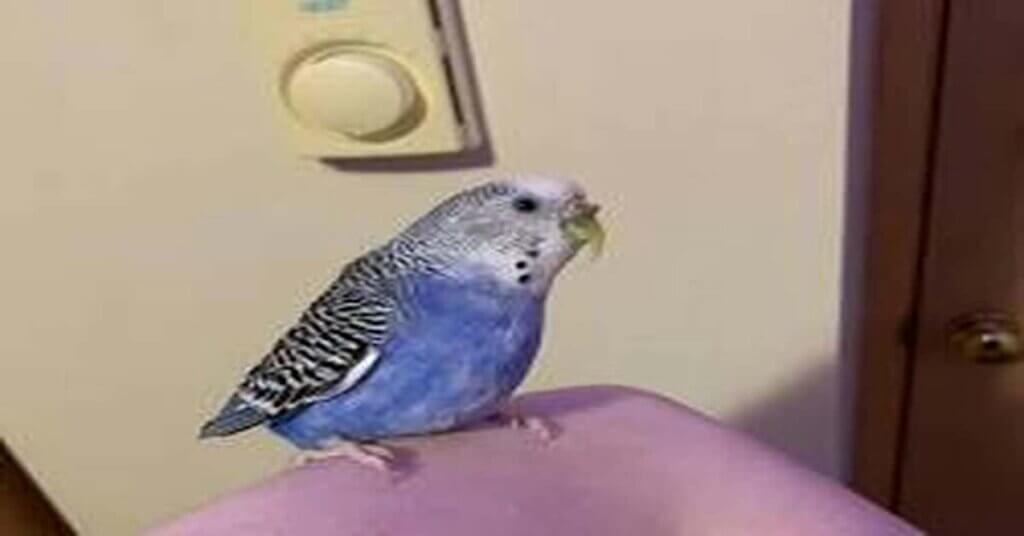
Budgies make wonderful pets. They have bright colors, lively personalities, and are easy to care for. However, like all pets, they can sometimes display abnormal behavior that may indicate an underlying health or behavioral issue.
Here’s a breakdown of abnormal behaviors in budgies. Remembering that some of these could indicate an underlying illness is crucial, so consulting an avian veterinarian is always recommended.
1. Lethargy and Inactivity
- Normal: Budgies are naturally active and playful. They enjoy interacting, flying, and exploring.
- Abnormal: If your budgie seems unusually quiet, sits puffed up on a perch for extended periods, and doesn’t show interest in toys or activities, it could signal illness or depression.
2. Changes in Appetite
- Normal: Budgies have a healthy appetite and enjoy regular meals.
- Abnormal: Significant increases or decreases in appetite, especially if sudden, can indicate health issues. Watch for a refusal to eat, excessive eating, or changes in water consumption.
3. Feather Plucking or Damage
- Normal: Budgies preen their feathers to keep them clean and in good shape.
- Abnormal: Excessive preening, plucking out feathers, or finding damaged feathers that aren’t due to normal molting can indicate stress, boredom, medical problems, or nutritional deficiencies.
4. Aggression
- Normal: Occasional squabbles or displays of dominance are natural.
- Abnormal: Persistent biting, attacking other birds, or excessive cage defensiveness could be a sign of hormonal changes, pain, or even territoriality.
5. Changes in Vocalization
- Normal: Budgies are known for their chirping and chatter.
- Abnormal: A sudden reduction in vocalizations, unusually loud or shrill sounds, or changes in their usual chirps could indicate illness or distress.
6. Repetitive Behaviors (Stereotypies)
- Normal: Budgies might bob their heads or sway slightly for fun.
- Abnormal: Excessive head bobbing, pacing back and forth, rocking, or other repetitive movements that seem obsessive can be signs of boredom, stress, or neurological issues.
7. Discharge or Changes Around Eyes and Nostrils
- Normal: Eyes should be clear, bright, and free of discharge. Nostrils should be clean.
- Abnormal: Crusty or wet nostrils, nasal discharge, or swollen, red eyes signal potential respiratory infections or other health problems.
8. Changes in Droppings
- Normal: Budgie droppings have a solid part and a liquid part.
- Abnormal: Diarrhea, consistently watery droppings, undigested food in droppings, or color changes may indicate health concerns.
9. Self-mutilation
Self-mutilation is another type of abnormal behavior that budgies may exhibit. This can include feather plucking or even self-biting. This behavior can often arise from stress or boredom and harm your budgie’s health. If you notice any signs of self-mutilation, it’s essential to address the underlying issue and ensure that your budgie is getting enough stimulation and attention.
10. Excessive screaming
While budgies are naturally vocal, excessive screaming is not typical and can indicate an underlying issue. This issue can include anything from boredom or stress to a medical condition. If your budgie is screaming excessively, ensure it gets enough attention and stimulation. You may also wish to speak to an avian veterinarian to rule out any medical issues.
Important Considerations:
Occasional unusual behavior is normal. Look for persistent or drastic changes. Many abnormal behaviors can stem from illness. Consult an avian veterinarian promptly.
Enrichment with toys, safe flight space, and positive interaction will reduce stress and prevent boredom-induced behavior problems.
Identifying Abnormal Behavior In Budgies

Budgies can exhibit abnormal behaviors that may indicate an underlying medical or behavioral issue. Identifying these behaviors early can help in seeking the right help for your budgie.
Here are some physical and behavioral signs to look out for:
Physical signs to look out for:
- Puffed-up feathers
- Tail-bobbing when breathing
- Not eating their favorite food.
- Half-closed or closed eye(s) for much of the time
- Sleeping excessively
- Bad posture when at rest
Behavioral changes to observe:
- Aggression towards humans or other budgies
- Unusual feather plucking or self-injury
- Lack of vocalization or sudden silence
- Changes in eating or drinking habits
- Sudden increase in physical activity or flying into walls
- Unresponsive or lethargic behavior
Using a bird behavior specialist to diagnose:
If you suspect that your budgie is exhibiting abnormal behavior, it is recommended to consult with a bird behavior specialist. A specialist can diagnose your budgie’s behavior and provide appropriate treatment. They can also offer helpful tips and advice on caring for your budgie, including dietary needs and environmental enrichment.
Causes Of Abnormal Behavior In Budgies
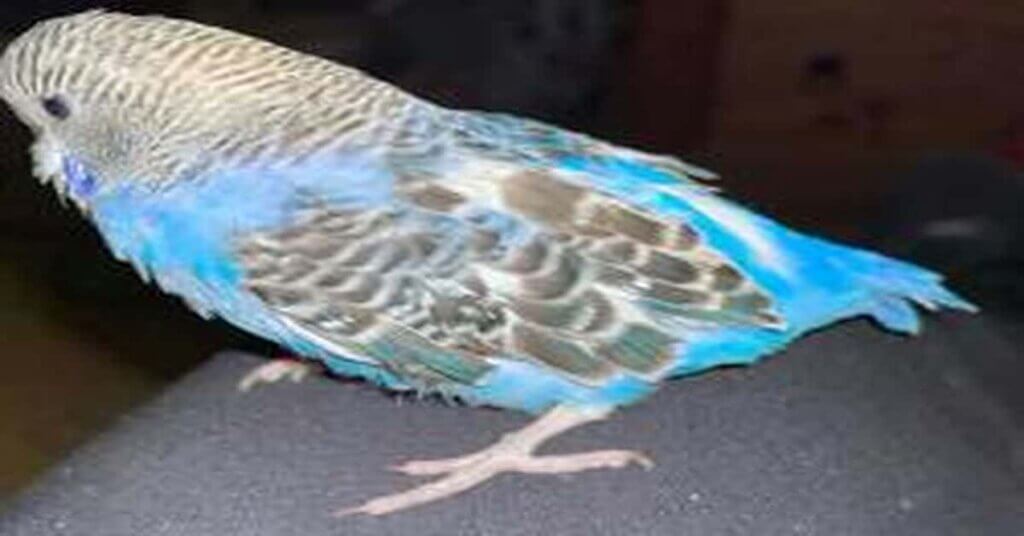
Several factors, including stress, poor diet, lack of exercise, and inadequate living conditions, can cause abnormal behavior in budgies.
These behaviors include feather plucking, excessive vocalization, aggression, and self-mutilation. It is crucial to identify and address the underlying cause of abnormal behavior to ensure the well-being of your pet budgie.
1. Environmental Factors
Environmental factors can significantly cause abnormal behaviors in budgies. These factors can range from exposure to loud noises or bright lights to changes in the bird’s living conditions. Budgies kept in small and cramped cages, without sufficient space to move around and spread their wings, may show signs of stress and anxiety. Similarly, a dirty or cluttered living space can be distressing for budgies, leading to behavioral issues.
2. Health Issues
Health issues can also cause abnormal behavior in budgies. Common health problems that may cause behavioral changes include respiratory infections, mites or other parasites, and digestive issues. Budgies in pain or discomfort may become lethargic, lose their appetite, or exhibit other unusual behaviors such as biting or feather plucking.
3. Inadequate Diet
An inadequate diet can also lead to abnormal behaviors in budgies. Budgies require a balanced diet that includes fresh fruits, vegetables, and seeds. If a budgie does not receive adequate nutrition, it may become lethargic, show signs of malnutrition, and display abnormal behaviors such as wing flapping or bobbing.
4. Lack Of Exercise
Budgies are active birds that exercise regularly to maintain their physical and mental health. A lack of exercise can lead to boredom and lethargy, which may cause abnormal behavior such as pacing or repetitive movements.
5. Social Isolation
Budgies are social birds that thrive on interaction with their owners and other birds. Social isolation can lead to boredom, loneliness, and stress. Budgies without sufficient social stimulation may develop abnormal behaviors such as feather-plucking or excessive screaming.
How To Prevent Abnormal Behavior In Budgies

Budgies are friendly birds that thrive on interaction and engaging environments. However, budgies may exhibit abnormal behavior when deprived of their essential needs. As a budgie owner, it is crucial to understand how to prevent abnormal behavior in your pet.
1. Providing a Healthy Diet
A healthy and well-balanced diet is essential for budgies‘ overall well-being. The diet should include fresh fruits, vegetables, seeds, and pellets. Ensure that you rotate the food so they don’t get bored. Avoid feeding them chocolate, caffeine, and avocado, which are toxic to birds.
2. Creating a Stimulating Environment
Budgies are intelligent birds that love to explore their surroundings. A stimulating environment with toys, swings, and perches that budgies can climb and chew on will keep them entertained. Additionally, they should be able to get enough sunlight and fresh air by allowing them to spend time outside their cage.
3. Encouraging Socialization
Socializing with other budgies or humans is crucial for their mental and physical well-being. Keep your budgies in pairs to encourage socialization, or spend time interacting with them daily. Budgies love human attention and enjoy being talked to, played with, and petted.
4. Ensuring a Comfortable Living Space
A budgie’s living space should be comfortable and spacious. Ensure the cage is big enough to allow them to move without restriction. Additionally, they should be provided with fresh water, clean bedding, and a sanitized cage regularly.
Treating Abnormal Behavior In Budgies
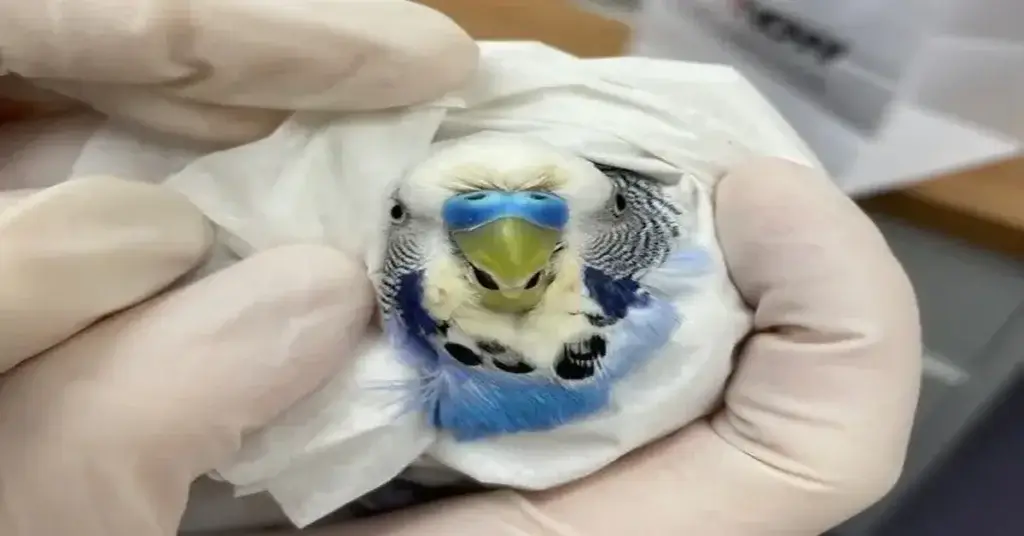
Budgies can exhibit abnormal behavior, including repetitive actions, self-mutilation, biting, and feather plucking. These behaviors can indicate stress, boredom, or insufficient space in their enclosure.
If you notice any abnormal behavior in your budgie, several treatment options can help. Here are some of the most common ways to treat abnormal behavior in budgies:
1. Medical Treatment Options
In some cases, abnormal behavior in budgies may be caused by an underlying medical issue. If this is the case, treatment will likely involve medication prescribed by a veterinarian. Examples of medical problems that can cause abnormal behavior in budgies include respiratory infections and parasites.
2. Behavioral Training Techniques
In many cases, behavioral training techniques can correct abnormal behavior in budgies. These include positive reinforcement training, where the bird is rewarded for exhibiting desirable behaviors. Other training techniques may involve changing the bird’s environment to reduce stress or provide more stimulation.
3. Working With A Bird Behavior Specialist
If your budgie’s abnormal behavior is severe or has not responded to other treatment methods, you may want to consider working with a bird behavior specialist. These professionals have experience working with birds and can provide customized treatment plans to help your budgie overcome their issues.
4. Therapy And Enrichment Activities
Finally, therapy and enrichment activities can also help treat abnormal behavior in budgies. These activities can keep the bird mentally stimulated and engaged, which can help reduce stress and anxiety. Examples of enrichment activities include providing toys and puzzles, offering different food options, and creating a stimulating environment for the bird to explore.
Caring For Budgies With Abnormal Behavior
Abnormal behavior in budgies may include regurgitation, beak tapping, wing flipping, head bobbing, and eye pinning. Rubbing the face on the cage, rubbing the head on the tail, and bathing may also be signs of abnormal behavior. Pay attention to these behaviors and seek veterinary care if necessary to ensure good health for your pet bird.
Creating A Safe And Comfortable Living Space
Budgies with abnormal behavior need a comfortable and safe environment to help them feel secure. Ensure their cage is the correct size and free from hazards that could cause injury. Provide perches of varying sizes and shapes for their feet and a few toys to keep them entertained. Cover the cage with a cloth or a blanket at night to help them sleep and provide security.
Establishing A Regular Care Routine
Consistency is key when caring for budgies with abnormal behavior. Establish a daily routine for feeding, watering, and cleaning their cage to create stability and routine. Monitor their behavior closely to detect any changes or potential health issues.
Providing Mental And Physical Stimulation
Budgies are active and intelligent birds that need plenty of stimulation to prevent boredom. Provide them with various toys, including puzzles and interactive games, to stimulate their minds and keep them engaged. Regular exercise is also vital for their physical and mental well-being, so allow them to fly around the room under close supervision.
Building Trust And Bond With The Bird
Building trust with your budgie can help reduce abnormal behavior and improve their happiness. Spend time talking to them in a soft and gentle tone, offer them treats, and let them explore you and their surroundings at their own pace. Be patient and understanding, and avoid making sudden movements or loud noises that could alarm them.
By following these guidelines, you can provide the care that budgies with abnormal behavior need to live happy, healthy lives. Remember, each bird is unique, and it may take time and patience to discover what works best for your feathered friend.
Sum Up
Observing abnormal behavior in your budgie is crucial for its well-being. As a pet owner, you must be aware of the signs and symptoms of unhealthy behavior, including changes in eating habits, puffy feathers, and excessive sleeping.
While occasional bursts of temper are normal, out-of-the-ordinary behavior such as fear, aggression, or nonsensical repetitive behavior may indicate a problem.
You can ensure a happy and healthy budgie by monitoring your budgie’s actions closely and consulting with a veterinarian if necessary.
Hello Dear, I'm Poli Kolymnia, owner of many birds (including budgies).
With a deep passion for these feathered companions, I'm here to share my expertise and extensive knowledge on birds care.
My articles cover essential topics like diet, housing, care, and health, providing practical tips to help you create a happy and thriving environment for your birds.
